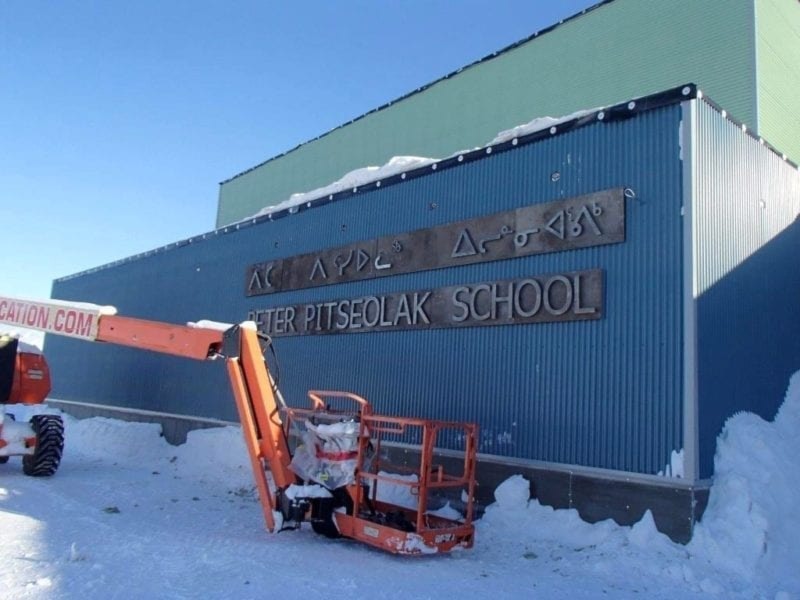Education
Nunavut Schools Face Teaching Shortages Despite Recent Progress

Recent data from the Government of Nunavut reveals that the territory has filled only 79 per cent of its teaching positions, highlighting a significant shortage of educators. As of August 22, some communities, particularly Naujaat and Whale Cove, are grappling with the most acute vacancies. The Department of Education’s figures indicate that the distribution of teaching shortages varies greatly depending on the region and school.
Tuugaalik High School in Naujaat reports the highest vacancy rate, with 52 per cent of its teaching positions unfilled. In Whale Cove, Inuglak School is facing a 47 per cent vacancy rate, while Peter Pitseolak School in Kinngait has a 37 per cent vacancy. Notably, the Qikiqtani region is experiencing the least severe teaching shortages, with Kivalliq facing the highest rates of unfilled positions.
According to the Government of Nunavut, there are currently 172 unfilled teaching positions across the territory. “Similar to what is occurring across Canada and the globe, Nunavut schools are experiencing a teaching shortage. Recruitment is a priority for the department to attract more educators,” stated Sandi Chan, communications officer at the Department of Education.
To address these shortages, the Department of Education is actively recruiting teachers through local training initiatives, such as the Nunavut Teacher Education Program. Additionally, promotional campaigns are being conducted via social media, and partnerships have been established with southern universities to attract qualified educators.
The recruitment strategy has been supported by a recent agreement with the Nunavut Teachers Association, which awarded staff a nine per cent wage increase on July 1. Further financial incentives include planned pay raises of three per cent in both 2026 and 2027. Furthermore, the department is developing an Inuit-specific Educator Retention and Recruitment Action Plan to enhance teacher stability in the region.
As the new school year begins, Kivalliq and Kitikmeot schools started classes on either August 15 or August 22, while most schools in the Qikiqtani region will commence on September 3. This year, for the first time, children in kindergarten and Grade 1 will engage with a made-in-Nunavut curriculum. This curriculum emphasizes Inuktut during the earliest educational stages, fostering a strong sense of identity and cultural belonging among students.
In addition to the curriculum updates, the Department of Education has launched two online tools aimed at promoting literacy among young learners. The Online Family Learning Hub was introduced in June, offering a range of colorful picture books and traditional cultural tales. Earlier, in May, free Inuktitut and English language resources, including storybooks, audiobooks, teaching materials, and music, became accessible through the Early Learning and Child Care Directory.
The efforts to recruit teachers and enhance educational resources underscore the Government of Nunavut’s commitment to improving educational outcomes in a territory where geographic challenges and cultural considerations play a significant role in the educational landscape.
-

 Science2 months ago
Science2 months agoToyoake City Proposes Daily Two-Hour Smartphone Use Limit
-

 Health2 months ago
Health2 months agoB.C. Review Reveals Urgent Need for Rare-Disease Drug Reforms
-

 Top Stories2 months ago
Top Stories2 months agoPedestrian Fatally Injured in Esquimalt Collision on August 14
-

 Technology2 months ago
Technology2 months agoDark Adventure Game “Bye Sweet Carole” Set for October Release
-

 World2 months ago
World2 months agoJimmy Lai’s Defense Challenges Charges Under National Security Law
-

 Technology2 months ago
Technology2 months agoKonami Revives Iconic Metal Gear Solid Delta Ahead of Release
-

 Technology2 months ago
Technology2 months agoSnapmaker U1 Color 3D Printer Redefines Speed and Sustainability
-

 Technology2 months ago
Technology2 months agoAION Folding Knife: Redefining EDC Design with Premium Materials
-

 Technology2 months ago
Technology2 months agoSolve Today’s Wordle Challenge: Hints and Answer for August 19
-

 Business2 months ago
Business2 months agoGordon Murray Automotive Unveils S1 LM and Le Mans GTR at Monterey
-

 Lifestyle2 months ago
Lifestyle2 months agoVictoria’s Pop-Up Shop Shines Light on B.C.’s Wolf Cull
-

 Technology2 months ago
Technology2 months agoApple Expands Self-Service Repair Program to Canada









